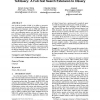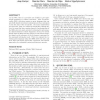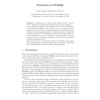710 search results - page 61 / 142 » Relational Expressive Power of Constraint Query Languages |
WWW
2004
ACM
14 years 8 months ago
2004
ACM
One of the key benefits of XML is its ability to represent a mix of structured and unstructured (text) data. Although current XML query languages such as XPath and XQuery can expr...
WEBDB
2004
Springer
14 years 1 months ago
2004
Springer
On the Web, there is a pervasive use of XML to give lightweight semantics to textual collections. Such documentcentric XML collections require a query language that can gracefully...
CIKM
1993
Springer
13 years 12 months ago
1993
Springer
match algorithms that can efficiently handleAbstract complex tests in the presence of large amounts of data. Match algorithms that are capable of handling large amounts of On the o...
AMW
2011
12 years 11 months ago
2011
Subqueries are a poweful feature which allows to enforce reuse, composition, rewriting and optimization in a query language. In this paper we perform a comprehensive study of the i...
DEBS
2007
ACM
13 years 11 months ago
2007
ACM
Queries for composite events typically involve the four complementary dimensions of event data, event composition, relationships between events (esp. temporal and causal), and acc...



